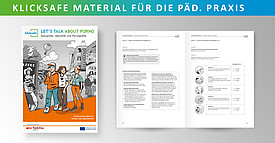Interview with Magdalena HeinzlThe challenges of sexual education

Magdalena Heinzl is a sex, trauma and theater educator and has been working as a clinical sexologist at the Sexological Center for Sexual Education in Upper Austria for 8 years. More information at: https://www.sexologisch.com/ She is also co-author of the klicksafe handout "Let's talk about porn".
What does the day-to-day work of a sexologist look like?
As a sexologist, I work with people of all ages and help them with their individual sexual development and issues. Whether in workshops for children and young people, in training courses for parents, caregivers and professionals, or in sex therapy in individual or couple settings - every day is different.
As a sexologist, you are asked a lot of questions about sexuality. Which question comes up again and again?
The question of all questions, which is behind almost every question, is: "Am I normal?" Whether it's about the frequency of sexuality in relationships, appearance, practices, etc. Of course, there are often myths, such as that the hymen tears and bleeds the first time or that masturbating too much makes you look worse.
You also answer children's questions about sexuality. How do these questions differ from those of young people and what do you have to bear in mind when answering them?
You always have to adapt to the developmental stage of the target group and also to the wording of the target group. As a professional, I listen carefully and try to decode questions that are often coded. I therefore try to provide an answer not only to the question asked, but also to all the questions that may lie behind it and are indirectly asked.
Young people consuming pornography on the internet - is this a problem or perhaps even a good thing for sexual education, for example?
Pornography exists in our society - whether we think it's good or bad is a question of attitude. The fact is, we are confronted with pornographic content. I think it's much more important than the question of whether porn is good or bad for (young) people to recognize that many people gain their knowledge of sexuality from porn. For me, comprehensive sexual education for all age groups is an important step towards ensuring that porn does not remain the first and, above all, only source of information on this topic.
What do young people need in order to develop a positive and healthy sexuality?
Basic sexual skills are developed in the first ten years of life. If we create a framework in which body awareness is promoted and topics relating to sexuality can be discussed, then this is not only health promotion, but also always prevention of sexual and sexualized violence.
In your opinion, what needs to be improved when it comes to sexual education in schools?
First of all, sexual education should be a fixed part of the curriculum in all schools that train educational professionals and not just an optional subject or even reduced to a few lessons. Sexual education should be a topic from an early age and not just at the onset of puberty. This responsibility should be borne by schools as well as parents and caregivers together with external specialists in order to create the best possible opportunities. Sexual education is not a "one-off conversation". It is our everyday life, how we deal with questions and how we deal with our own and other bodies and boundaries.
Some adults feel uncomfortable talking about sexuality. This can be a particular problem if, for example, you are asked to answer questions about sexuality as a teacher. What can you do in such cases to gain more confidence?
Acknowledging that you find it difficult is a good start. The more you deal with the topic yourself on a professional level, the better. Reflecting on your own sexual biography is hugely important in order to avoid values and norms simply being imposed on young people, which often misses the point of their lives. If you want to actively tackle the topic, I recommend training to become a sex educator.
Are there any mistakes or no-goes in (school) sex education work that should be avoided at all costs?
For me, sharing private information with pupils is a no-go. I was once in a class where the teacher talked about her first time. Certainly no malicious intent. But it was still offensive. And that's exactly why you have to deal with all these issues in a professional manner and sex educators and sexologists like me are very happy to help.




